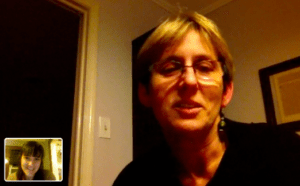While the city of Shreveport, Louisiana has its charms, I don’t miss too much about it other than the people.
The owner of the Indian food restaurant that always shouted his excitement over our arrival for dinner. The friends with whom we cooked elaborate brunches to compensate for the lack of restaurants serving brunch.
And, my in-laws.
The first time I ever “met” my Israeli mother-in-law was through her cooking. Yoni, who was still just my boyfriend at the time, brought her homemade schnitzel back to college with him after a trip home. We ate it on the floor of his kitchen (which we later found out was infested with rats and roaches. Ah, college). Since that day seven-ish years ago, I’ve enjoyed learning more about my mother-in-law’s Israeli culture, from tasting sufganyot to hearing stories about growing up on an Israeli citrus farm. We’ve also bonded over our shared love of reading, so when I realized that Federation was bringing three Israeli authors to Minneapolis, I knew she would be jealous. And she was. Especially about tomorrow’s author, Sayed Kashua.
“Let’s put it this way,” she says, “I started paying to read Ha’aretz online so I could read his column.”
Kashua, an Arab-Israeli satirist, is known for his irreverent depiction of a life seemingly stuck between the two cultures. He uses humor to address the issues facing Arabs and Israelis — although not everyone appreciates the approach. His fan base is predominantly Jewish Israelis.
With three novels under his belt — one of which, Second Person Singular, received the prestigious Bernstein Prize for Israeli literature — Kashua is working on a fourth book and continuing work on the television series he created, Avodah Aravit (Arab labor).
I could continue to recite facts about Kashua and opinions formed through web-searches from across the globe, but when I was asked to tell you why you should hear Sayed Kashua speak TONIGHT at the Sabes JCC at 7 pm, I knew there was someone who could describe his appeal better than I could. So I would like to introduce you to my mother-in-law, Yehudit Platt.
 We connected via FaceTime, and Yehudit happened to be knitting me a hat while we spoke. (See?? What’s not to like?)
We connected via FaceTime, and Yehudit happened to be knitting me a hat while we spoke. (See?? What’s not to like?)
New Jew In Town: How long have you been reading Kashua’s work?
Yehudit Platt: I think I discovered him a few years ago. Every Friday, the first thing I do after waking up is read his column. He’s just so hilarious and cynical.
NJIT: How does Kashua’s ethnicity play in to his work?
YP: Sometimes you just feel sorry for him. He lives a very schizophrenic life. As an Arab living in Jerusalem, in a Jewish neighborhood, he always feels embarrassed when he’s around other Arabs, who are usually lower class. I recently read something he wrote about having his home renovated — the laborers were Arab — and he felt like he couldn’t be their boss. The awkward situations make for good stories, but he says that other Arabs hate him, call him a traitor; right wing Israelis hate him because he’s a lefty. So he’s pretty controversial.
I saw a piece on YouTube, where someone asked him what he would do if his daughter found a Jewish husband. He replied something like, “Let me see… I invest in good education, she goes to bilingual school, ballet classes, piano classes… and she dares bring me an Arab? I would throw her away.” So, yes, controversial.
NJIT: Well, the funniest people often are.
YP: Sometimes I can’t believe he dares to say the things he says. My sister and I — my sister is also a big fan — always remark “He’s not going to die in his bed.” We’re afraid of that.
NJIT: Is there an American celebrity you would compare Kashua to?
YP: [My father-in-law joins the conversation for this question, which sparks a bit of a debate. It’s a toss up between David Letterman and Jimmy Kimmel, although, they say, Sayed Kashua is much more personal in his material.]
NJIT: Why do you think American Jews in Minneapolis would enjoy Kashua’s writing?
YP: I think his life is similar, in a way, to the life of Jews in the diaspora. He’s always worrying about what kind of racial slurs his daughter will hear from other kids. He has to instruct her to whom she can reveal her background. He told her to make sure to look at the number on the phone before answering in Arabic.
Unfortunately, I think a lot of Jews here can relate on some level.
___
Presented by the Israel Center of the Minneapolis Jewish Federation and the Sabes Jewish Community Center. Sayed Kashua will speak and sign his books, Thursday, March 7th, at the Sabes JCC. There will also be a screening of two episodes of his hit Israeli TV Show, Arab Labor, in conjunction with the Minneapolis Jewish Film Festival.
$12 general admission
$10 students, seniors and JCC members


